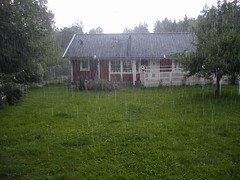February 13, 2008
Adaptive, Evidence-Based Climate Policy
 An old CNE post I forgot to post about here: Medical Climate Evangelism and Evidence Based Medicine. This one is about the BMJ:s call for doctors to become climate change evangelists.
An old CNE post I forgot to post about here: Medical Climate Evangelism and Evidence Based Medicine. This one is about the BMJ:s call for doctors to become climate change evangelists.
My annoyance with this is not so much that people care about the climate as trying to turn institutions that have particular purposes (such as medicine) into tools for this caring. Why not ensure that doctors are human rights evangelists, spreaders of the free (or regulated) market, and promoting literacy? While doctors can do good, one should not overload the core mission of the profession with too much. Especially since it would become the mouthpiece for whoever produces climate policy.
Oxford really is a hotbed of climate scepticism these days (cf The Wrong Trousers - Radically rethinking climate policy by Gwyn Prins and Steve Rayner). Mostly because of high standards of evidence and a dislike of decisionmaking done on weak grounds. The problem as Prins and Rayner points out is that there is plenty of political will and a defective political process ("The Kyoto Protocol failed because it is the wrong type of instrument ... relying too heavily on the wrong agents exercising the wrong sort of power"). There are also subtle issues of how to do climate modelling in order to learn something about the likely future, the inherent problems of getting convergence of the models in key areas and especially the disconnect between the physical climate and human outcomes. Of course, climate policy is relatively disconnected from the model science and the human outcome estimates, mainly using them as arguments for action rather than information for setting the right kind of action.
This is leading to a situation where we are going to hear very confident statements about risks and policies intended to ameliorate them, only to find that new results overturn the risks. This is to be expected given the properties of climate research (future-oriented, observation based, very non-linear, many levels of little understood interacting systems, lots of new data arriving) - but it is going to make specific policies look stupid and undermine confidence in the motivations for general policies.
A case in point is the recent report by the UK Department of Health that the increase in heat-related deaths in the UK may be offset by a decrease in cold-related deaths. It is also sanguine about malaria, while thinking there might be a 14.5% increase in Salmonella if food hygiene is not increased. Assuming this is actually based on real data and good models and not just spin, it contradicts a lot of the dire warnings about scorching death and tropical disease we hear. It also implies that adaptation should go a different way - but since it is based on evolving knowledge a report in a few years may tell us something different. Hence the only sane policy is to fix the things that make sense in all or most futures (like improving food safety) and assume greater variability about the level we have today (people might die more or less or heat or cold, so we should look at how to regulate our temperatures more cheaply; build to handle both more and less rain).
If doctors are to become climate evangelists they better think about making it evidence based.
Hmm, actually, maybe what we should aim for is something like the Cochrane Library for climate: independent high quality evidence to inform climate-related decision-making. Maybe climate policy can learn from medicine?
But that will mean that the policy has to be continually updated, something most decisionmakers don't like because it makes them look indecisive. They are elected to make decisions, hence they make them. So we need to make it worse for them to make the wrong decision and stick too long with it than to change decisions when the evidence no longer fits - that will likely keep down the number of unnecessary decisions too.
Posted by Anders3 at February 13, 2008 06:42 PM